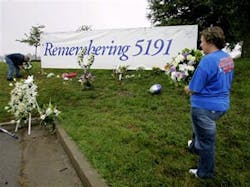Air Traffic Controller Had His Back Turned As Flight 5191 Taxied
A banner reading "Remembering 5191" hung near Blue Grass Airport on Wednesday as relatives of the 49 people killed in the Comair commuter plane crash arrived at the site of the disaster for a private memorial service.
Buses took them to the field where the plane went down early Sunday. Like that morning, there was a light rain Wednesday in Lexington, but it subsided before the service.
Federal investigators are looking into several possible factors that could have contributed to Sunday's deadly crash: a repaving project that had changed the taxiway route, the staffing in the control tower, even the pilots themselves.
The crew of Comair Flight 5191 at first boarded the wrong plane after checking in at 5:15 a.m., National Transportation Safety Board member Debbie Hersman said. A ramp worker alerted them to the error, and they moved to the right jet.
In the tower, only one traffic controller was on duty, a violation of Federal Aviation Administration policy, the FAA acknowledged Tuesday.
The controller cleared the regional jet for takeoff, then turned his back to handle administrative work and didn't see it head down the wrong runway, a strip that wasn't long enough for the twin-engine jet.
The crew struggled to get the plane airborne on the too-short runway and crashed in a nearby field, killing everyone aboard but the first officer, James Polehinke, who was pulled from the burning plane. Polehinke remained hospitalized Wednesday in critical condition.
Polehinke's mother, Honey Jackson, said her son is not to blame for the crash, and she asked people to be patient until all the facts were revealed.
"He could die at any moment," said Jackson, a singer who lives in Miami.
Polehinke was flying the plane when it crashed, but it was the flight's captain, Jeffrey Clay, who taxied the aircraft onto the wrong runway, Hersman said.
Clay's wife, Amy Clay, said he was a conscientious pilot and stickler for details.
"He was an excellent pilot, and my heart is broken for everyone involved in this, but I know with all my heart that they could not have been in better hands than they were with Jeff," she told The Cincinnati Enquirer.
Both crew members were familiar with the Lexington airport, Hersman said. She said Clay had been there six times in the past two years, and Polehinke had been there 10 times - but neither had been to the airport since a repaving project just a week before the crash altered the taxiway.
Wednesday morning, pieces of the charred aircraft are still scattered at the site, a field just beyond the airport that is now stained with fuel. The victims' remains are gone, and coroners from across the region had been working on the autopsies.
In an airport parking lot nearby, pens hung from the banner for writing remembrances. Someone had scrawled "I miss you." Next to it sat a large wreath from Kentucky Gov. Ernie Fletcher.
Authorities said the pilots and control tower talked about using the 7,000-foot main runway, but somehow the plane turned onto the shorter, 3,500-foot runway instead.
The air traffic controller, a 17-year veteran at the airport who has not been publicly identified, had an unobstructed view of the runways and had cleared the aircraft for takeoff from the longer runway, Hersman said.
Then, "he turned his back to perform administrative duties," she said.
FAA spokeswoman Laura Brown said the controller at Lexington had to keep track of airplanes on the ground, those in the air up to a few miles away, and watch the radar - even though a November 2005 FAA directive required control tower observations and radar approach operations be handled by separate controllers.
Polehinke had a clean record as a pilot, with no accidents or mistakes, authorities said. He spent five years - from 1997 to 2002 - flying short-range, twin-engine planes for Florida-based Gulfstream International Airlines. He flew at small airports all over Florida and the Bahamas, starting as a first officer and getting promoted to captain in 2000.
___
Associated Press writers Elizabeth Dunbar in Lexington; Leslie Miller in Washington; Bruce Schreiner in Louisville; and Melissa Nelson in Pensacola, Fla., contributed to this report.
News stories provided by third parties are not edited by "Site Publication" staff. For suggestions and comments, please click the Contact link at the bottom of this page.

